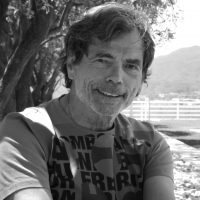On November 4, 2013, artist Richard Tuttle spoke about his oeuvre and the importance of art in our society, to a filled auditorium at Tate Modern as part of the American Artist Lecture Series; a unique collaboration of the U.S. Department of State’s Office Art in Embassies with Embassy London and Tate Modern. This partnership welcomes audiences of young artists and scholars in a lecture hall format.
After the conclusion of the lecture, the audience was invited to continue the conversation with the artist during a short reception on the 6th floor of Tate Modern, where the artist engaged directly with many of the students from different colleges in the London metropolitan area. The United States Ambassador to the United Kingdom, Matthew Barzun and his wife Brooke Barzun, attended the lecture as well as the reception.
Tuttle, the third artist to participate in the lecture series, is one of the most significant American artists working today. Since the mid-1960s, he has created an extraordinarily varied body of work that eludes historical or stylistic categorization. The artist has been the subject of hundreds of solo exhibitions since 1965, including numerous museum surveys, ranging from his first, at the Whitney Museum of American Art in 1975, to more recently, a two-year travelling retrospective organized by the San Francisco Museum of Modern Art (2005-2007). His work is held in nearly every major collection worldwide, including in Europe at the Stedelijk Museum, Amsterdam; the Centre Pompidou, Paris; and Kunstmuseum Winterthur, Switzerland; the Hirshhorn Museum and Sculpture Garden, Smithsonian Institution, and the National Gallery of Art in Washington, D.C., and The Metropolitan Museum of Art and The Museum of Modern Art in New York, among many others. In 2012, Tuttle was elected to the National Academy. He was the Artist in Residence at the Getty Research Institute from September 2012- to- June 2013, and is a long time contributor to AIE.


